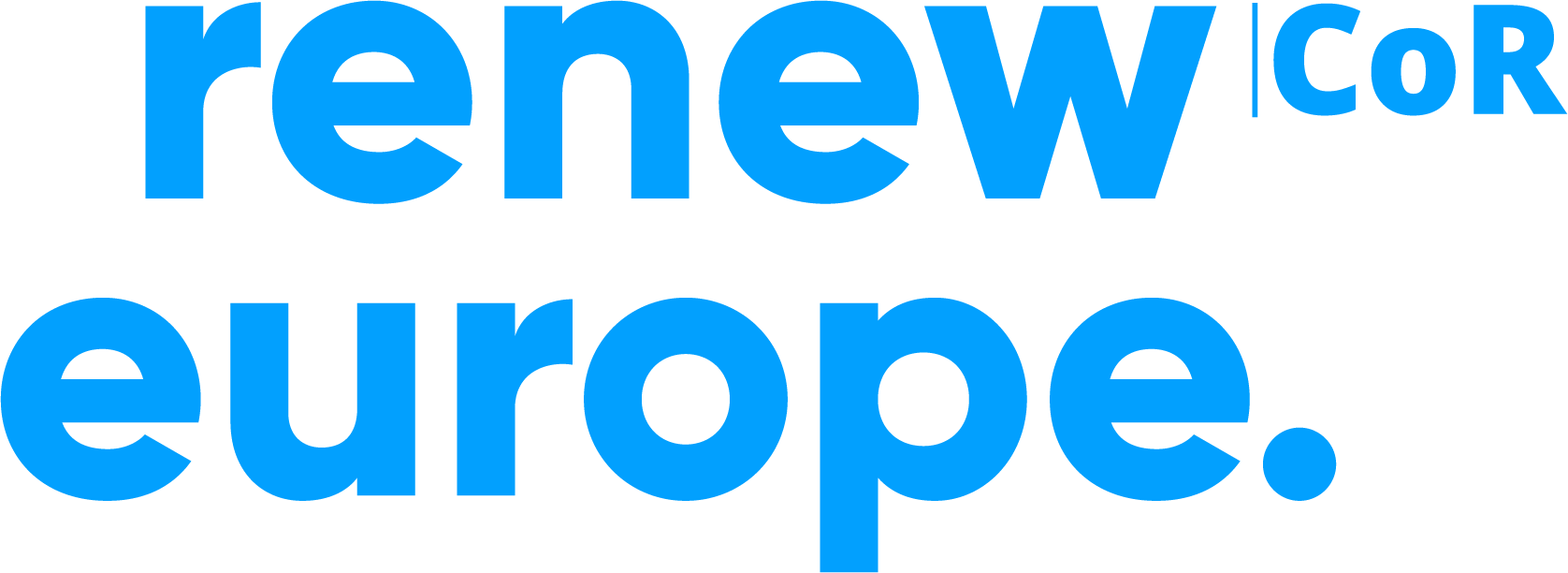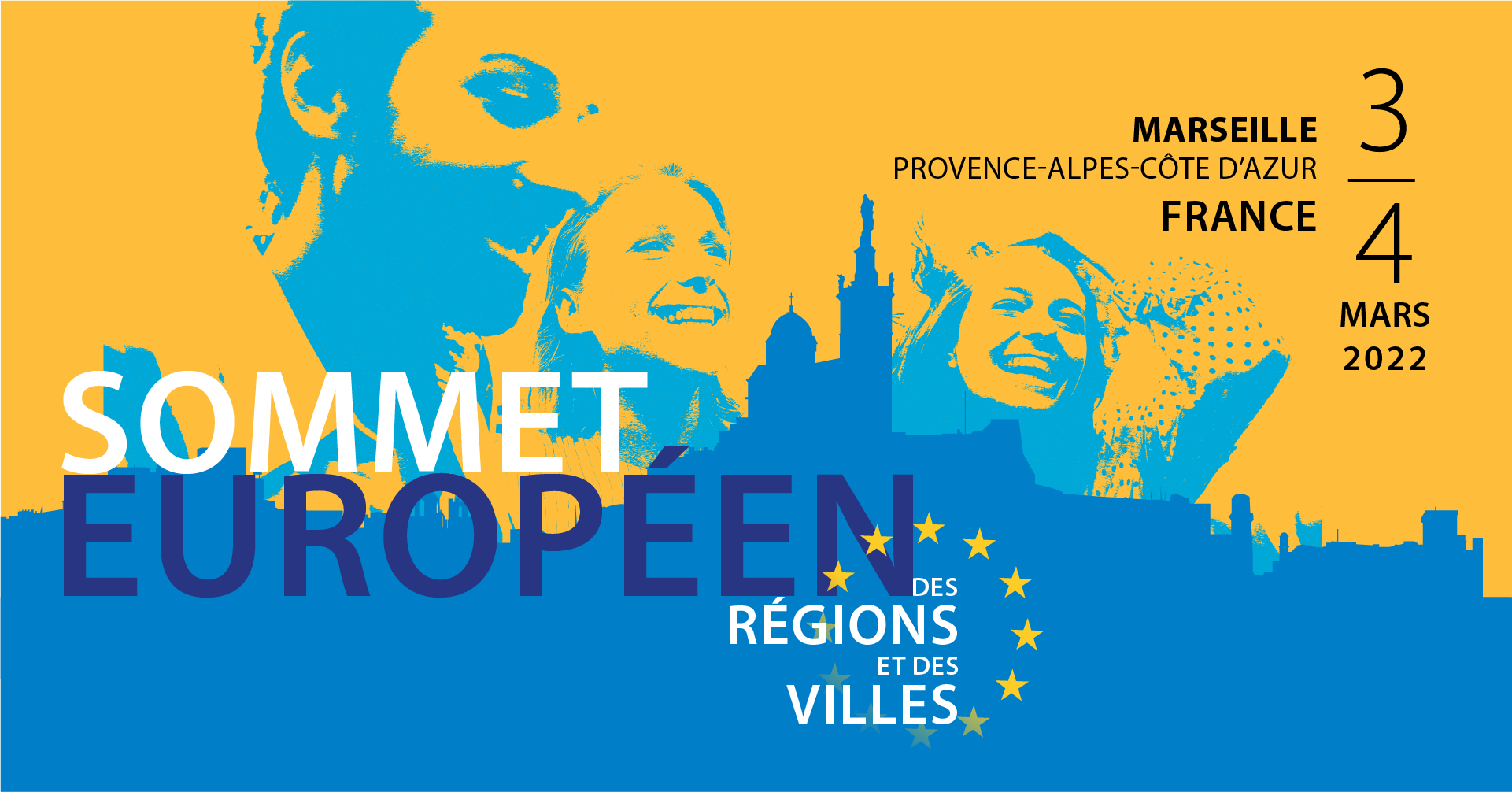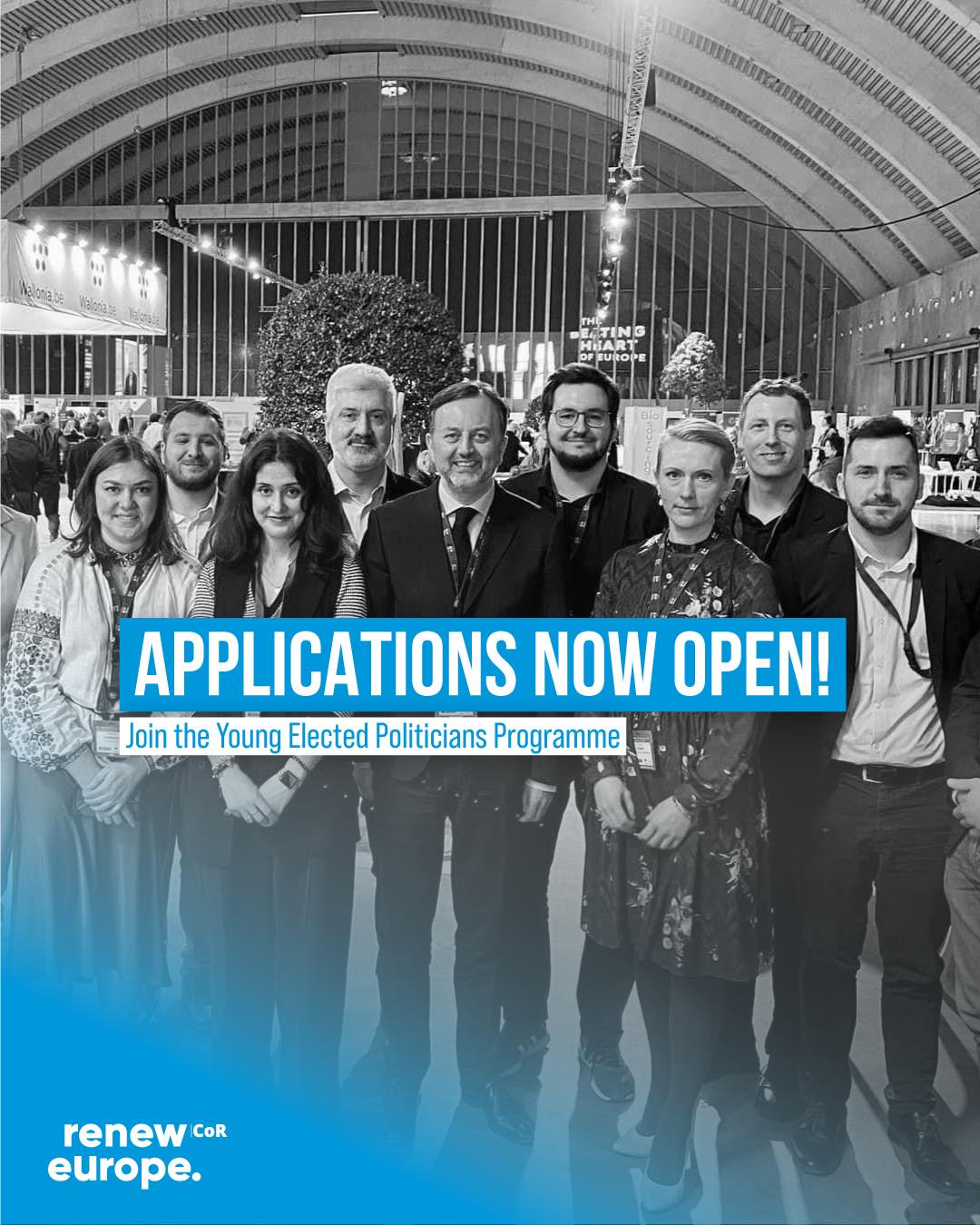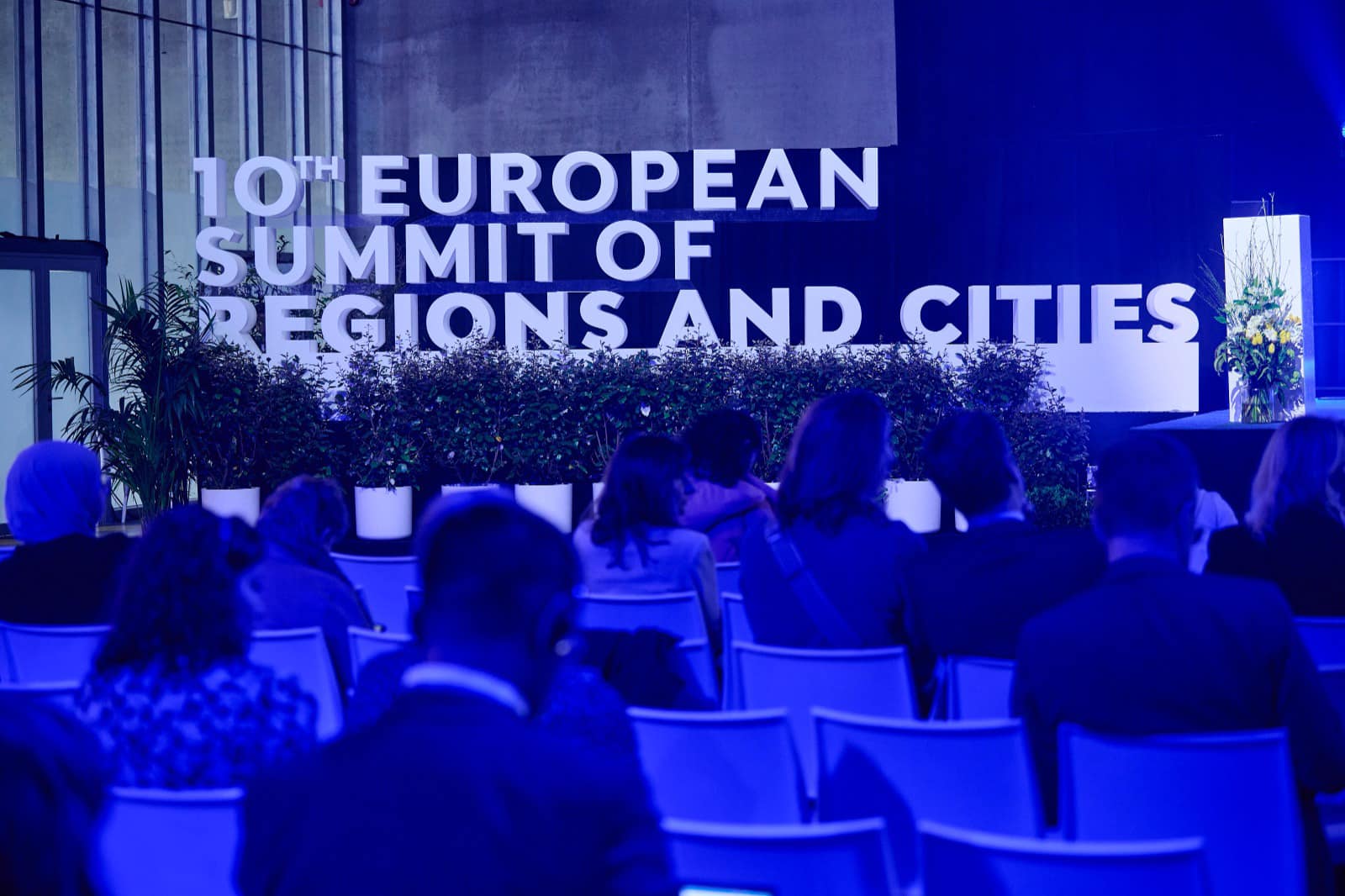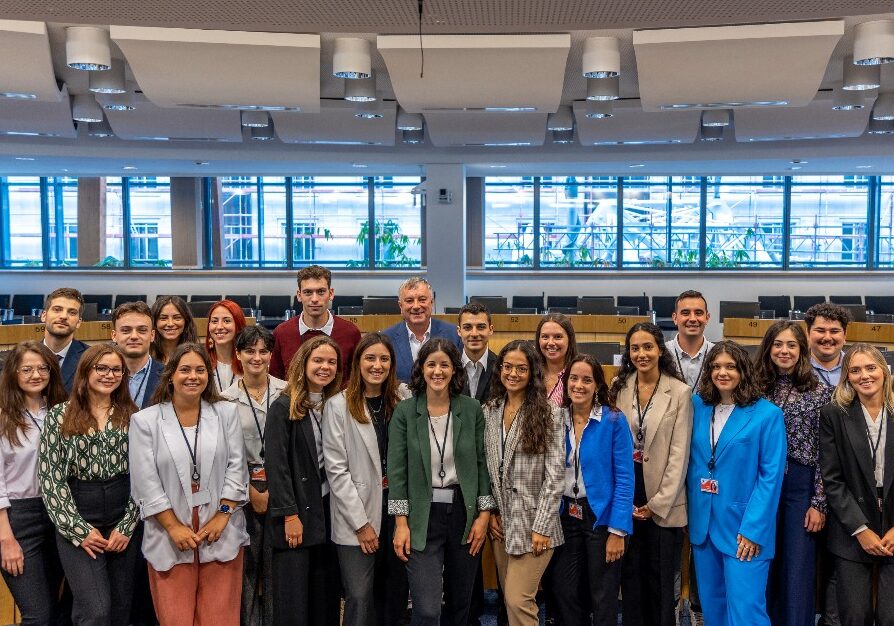The biennial Summit of Regions and Cities, organised by the European Committee of the Regions, took place in Marseille (France) as the largest event of the French Presidency with over 2000 participants and top representatives from the EU institutions and national governments. In light of the brutal invasion of Ukraine by Russian forces, the Summit focused on how EU regions and municipalities can provide support to Ukrainian refugees and to Ukrainian subnational authorities. This blog features the interventions by Vincent Chauvet, Guy Verhofstadt MEP, Paula Fernandez Viaña, Dovydas Kaminskas, Marius Ursacuic, François Decoster, Jasna Gabric, Clément Beaune, Jacqueline Gourault, Werner Hoyer, Nicola Caputo, Mart Vorklaev, Anne Rudishuli, Mirja Vehkapera, Willy Borsus, Gints Kaminskis, Inga Berzina, Vytautas Grubliauskas and Manuel Alejandro Cardenete.
— This overview/blog covers the Marseille Summit of 3 & 4 March —
FRIDAY 4 MARCH
At the round table on the building blocks of European Democracy, Guy Verhofstadt MEP and François Decoster shared their views on the recent developments.
The city of Autun, France, was one of the first to host Ukrainian refugees. Its Mayor and our member Vincent Chauvet spoke to several media about this development and how he and his city are helping these refugees:
Guy Verhofstadt MEP:
“We need to start thinking about membership for countries such as Ukraine, Georgia, Moldova. At the same time we need to speed up further integration to be ready for the new world order of tomorrow. In the meantime we have to help Ukraine. This is a war against Putin and his cronies, not against the people of Russia. They are a peaceful people, who want another Russia for themselves. There’s a huge democratic movement inside Russia we have to support. Let’s not forget there are millions of citizens in the EU whose mother tongue is Russian. This is a war against Putin, a war criminal, an autocrat, not a war against the Russian people who belong to our European culture and civilization.”
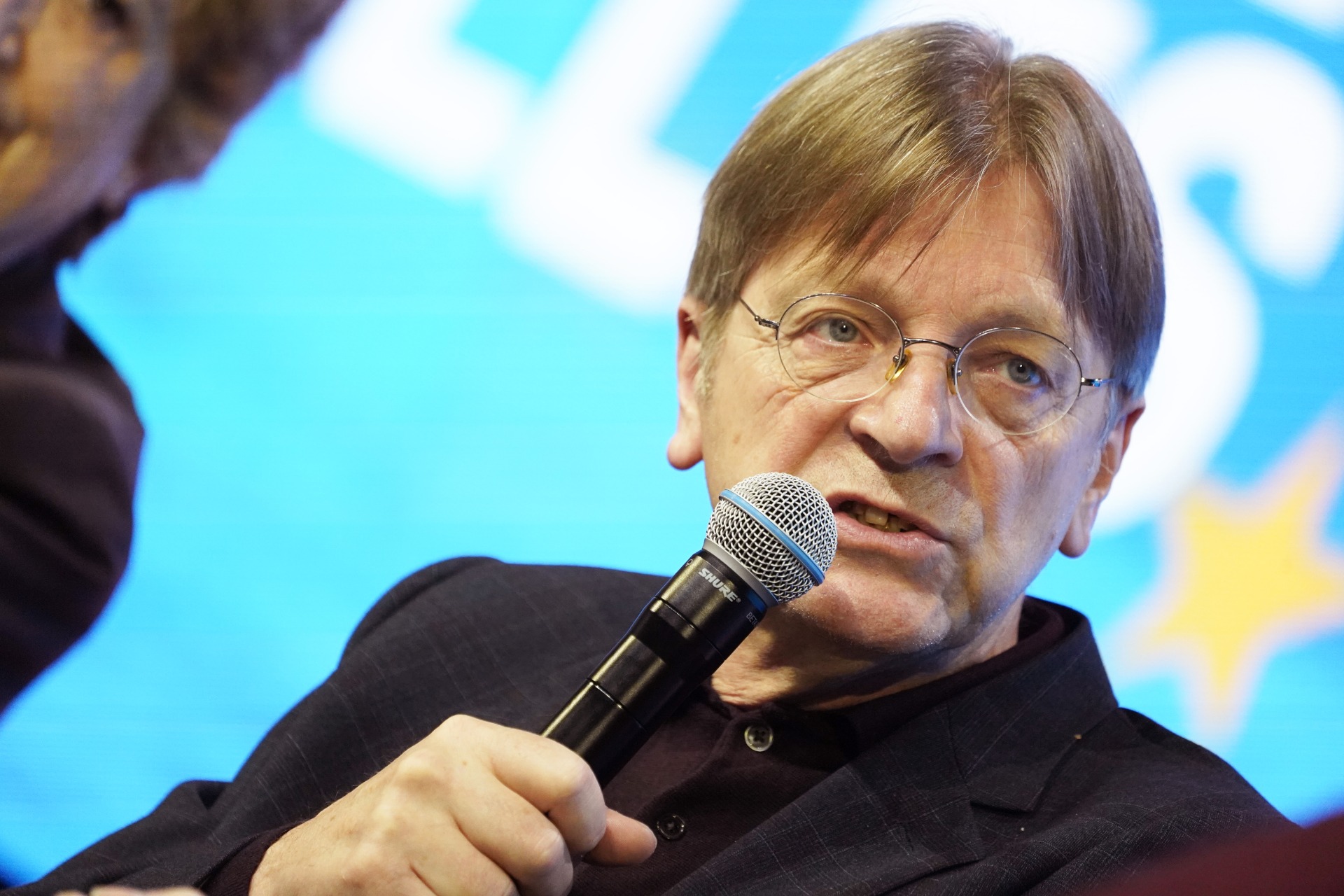
Paula Fernandez Viaña:
“The war in Ukraine is a cultural war against democracy, values, diversity, human rights,…All of which are backbones of our European project. This is a war on the European continent, and we need unity of action and strength. It is an invasion, synonymous with an invasion of Europe. More than ever we need to start going towards a federal state, towards a union of defence, towards a real political union.”
Dovydas Kaminskas, Mayor of Tauragės, Lithuania, also commented on the Ukrainian invasion, highlighting the courage of Ukrainian defenders, and how it us on us, Europeans, how long this conflict will last, seeing solidarity but how solidarity alone is not enough:
video
The city of Mayor Marius Ursacuic, Gura Humorului, Romania, is only at 60 kilometers from the border with Ukraine and therefore really sits in the second line: in the last few days there have been almost 60,000 Ukrainian refugees who crossed the border fleeing Ukraine. Ursacuic discussed the recent events from his city in an interview with Italian radio RAI in Caffè Europa (starts at 12:45).
THURSDAY 3 MARCH
Special Session on Ukraine
During the EU enlargement’s panel session at the Marseille Summit, Jasna Gabric, Mayor of Trbovlje and co-chair of the Joint Consultative Committee on North Macedonia, argued:
“I think we need to profoundly change the way we deal with candidate countries. Do we really need unanimity to even start negotiations? This is a question that the current Conference on the Future of Europe should address. I also fear that if we would do a fast track procedure for Ukraine that it might create resentment among the countries in the Western Balkans that have been knocking on our door for many years and the process has been advancing very slowly. We need to provide a credible European perspective to the Western Balkans as well as to Ukraine. I believe we need to:
1) unblock the situation with North Macedonia and Albania and start the long awaited negotiations
2) work towards granting EU candidate status to Ukraine
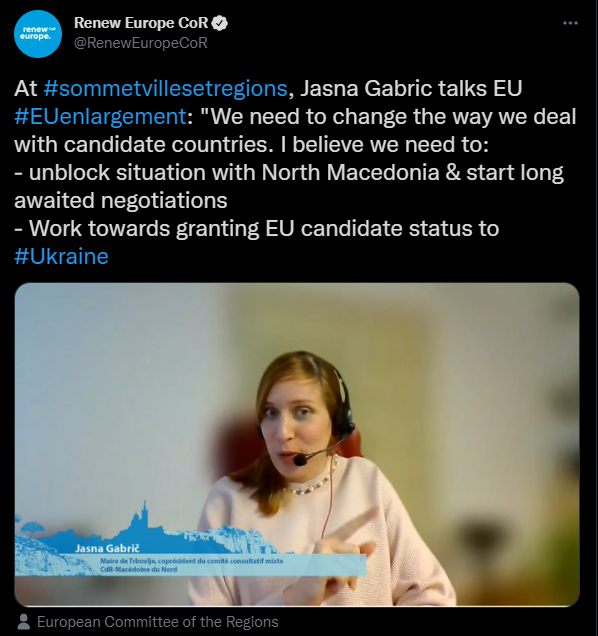
At the Marseille Summit, François Decoster delivered a passionate plea based on the current solidarity for Ukrainian refugees: “the current outpouring of solidarity towards Ukrainian refugees could create the conditions for a new EU-wide coordinated policy of ALL refugees, wherever they come from”
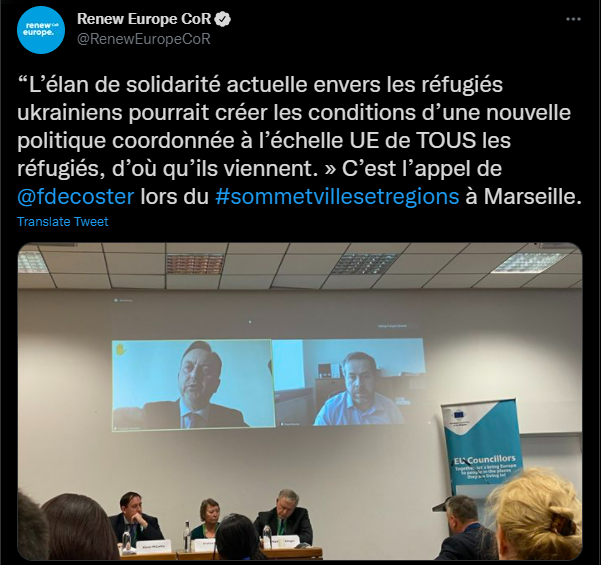
During the special session on Ukraine, Clément Beaune, French Secretary of State for European Affairs, Werner Hoyer, President of the European Investment Bank and Jacqueline Gourault, French Minister for Territorial Cohesion and Relations with Local and Regional authorities intervened on Ukraine.
Clément Beaune said:
“This Summit is more important than ever – we are facing and dealing with a crisis which will last, where we need to save the lives of the people of Ukraine. All along this war, the local and regional authorities are stepping up as Ukraine is fighting for the EU and for democracy, for a Europe of values. This is our fight, with our values, that must be waged. Our cities and regions will be at the heart of our response in terms of solidarity and sovereignty”
Jacqueline Gourault said:
“This unprecedented aggression against Ukraine occupies all our minds. It reminds us that in the face of war we have to be united more than ever and we will remain as such since liberty has no price. Continuing cohesion policy is therefore also essential as it disposes of the largest budget of the EU. The French Presidency will continue to look after and ensure that solidarity will remain at its strongest at the European level; our political, democratic and moral engagement will continue.
Werner Hoyer:
“We stand ready to deliver an emergency solidarity package for Ukraine as part of a coordinated EU response. The package will contain three elements: an immediate liquidity support of €700 million for Ukraine’s authorities, repurposing infrastructure projects worth €1.3 billion for transport, energy, digital reconstruction among other things, and we also look to support the rebuilding of whatever the Russian army knocked down – critical infrastructure and more. The war might also lead to economic contraction and an upward pressure on prices, so we keep in mind the impact it might have on countries inside and outside the EU, and for possible support measures for the hardest hit regions in the EU to avoid economic divergence”.
Nicola Caputo, Regional Minister for the Italian region of Campania:
“We’re back in a time we thought would belong to the past. It opens an old wound. Today’s future looks to be one of instability and an end to Europe’s credibility. It attacks our values so it justifies a large support for the Ukrainian people – it is necessary to continue European integration policies; to face this old world in all its cruelty it is time for unity and to be strong in all decisions. The EU can only but strengthen the integration process as a way of refusing and refuting war in the world.”
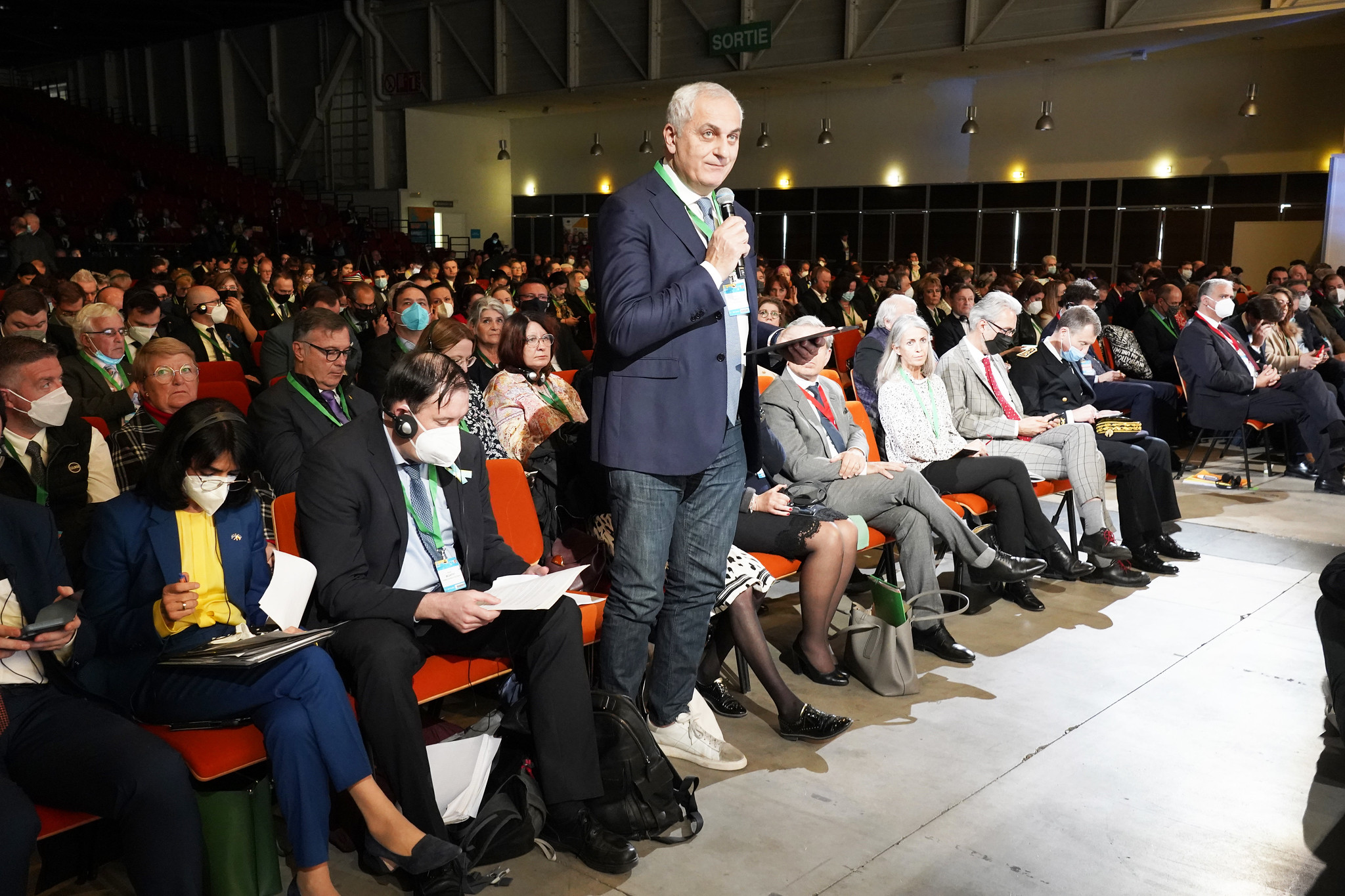
Read more on Nicola Caputo on Ukraine in Italian newspaper Il Messaggero.
Our member Vincent Chauvet, Mayor of Autun, France, also decided to host families of refugees in his city, working together with his citizens and local associations.

Earlier, our President François Decoster, Mayor of Saint-Omer, during the ALDE party meeting, participated in a video conference hosting Olga Stefanishyna, Vice Prime Minister of Ukraine, testified about and described the mobilisation of European regions and cities to show their support to the Ukrainian people and to organise help, most notably to families fleeing the country. This solidarity and generosity follow on the requests of President Volodymyr Zelensky for a recognition of Ukraine as a candidate country to join the EU and also expresses our community of destiny.
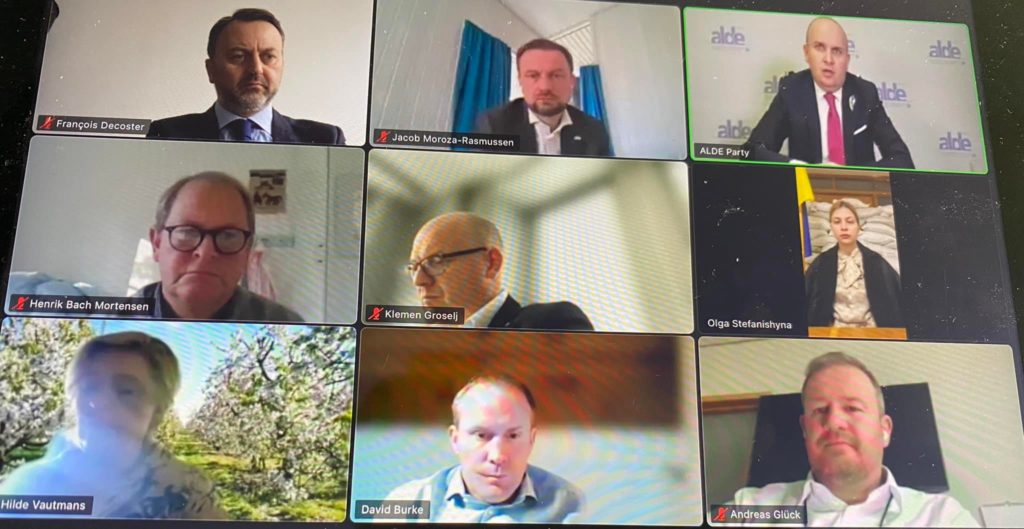
At the European Committee of the Regions Bureau meeting, our member Mart Vorklaev, member of the Rae Rural Municipality Council, Estonia, started the focus on Ukraine with his intervention:
“Mr. president, dear colleagues and the heroes in Ukraine. It is awful what is going on in Ukraine. Seven days ago Russia started a war in the middle of Europe. President Putin is attacking a democratic and free state and killing innocent people and children. The soldiers and people of Ukraine are currently fighting for peace in Europe and for the security of all of us. We definitely need to support Ukraine with words of support, money and military equipment. At the local level we have to call up municipalities and our citizens to donate money to Ukraine, they need money for military purpose and also for humanitarian purpose. And at the local level, we must be prepared to receive refugees; we must support the strictest possible restrictions to Russia. And we definitely must support the granting of candidate status to the European Union to Ukraine and attach it to our declaration. In the Estonian parliament we made such a statement last Wednesday just a few hours before the war began. Slava Ukraine and welcome to the European union!”
WEDNESDAY 2 MARCH
Renew Europe CoR Group Meeting
At the Renew Europe CoR Group Meeting in preparation of the Marseille Summit in Marseille, several members took the floor regarding the situation in Ukraine and how their municipalities, cities, regions,… have reacted / acted:
François Decoster, Mayor of Saint-Omer, opened:
“A few months ago when preparing this Summit in Marseille we would never have imagined to be in such a situation what we have been living for a week now – the invasion and war in Ukraine was something none of us would have witnessed in our lifetime. Yet this summit is an opportunity to really tell voices of citizens of hundreds of millions of citizens in Europe expressing their concern and the will to act. We have a very active role in eastern partnership and we are very active in the Working Group on Ukraine with local authorities – besides EU institutions, Member States, the local authorities within the European Committee of the Regions can really express strong solidarity and rejection if war, invasion and also build future of EU and future of Ukraine with us. Our family is at the forefront as the party of the Ukrainian President was accepted as member of the ALDE family – showing how our political family is directly involved in the crisis and we are together with our Ukrainian friends as we are members of the same political family.”
The Renew Europe Group in the European Committee of the Regions’ newest member, Anne Rudishuli, said: “I’m proud of my department – Bouches-du-Rhône – as we were the first in France to set aside 100.000€ for Ukrainian refugees.”
Mirja Vehkapera, Chair of the Oulu city council in Finland:
“What is happening in Europe – this war is terrible. We have to stand beside the Ukrainians and be strong together. In Finland, we have a long history with Russia and it seems we have been blind, having been very diplomatic. We share a 1,000-kilometre border with Russia, so we are also a little bit afraid. In a local way, we have to do our duties by supporting Ukrainians, for instance by setting aside 100.000 euro’s, just like other Finnish cities.”
Willy Borsus, Vice-President of Wallonia and Minister for the Economy and External Trade: “What is important in such horrible circumstances is to be united, and to stay united in coming days and weeks. Our solidarity should be political, happening on different levels: military, humanitarian and taking into account urgency of situation. Some fundamental principles of our reflections should take into account strategic autonomy of Europe, that we need a real defence Europe, that we should be less dependent in terms of energy for instance. We will have to review our political choices.”
Gints Kaminskis, member of the Auce municipal council, Latvia: “Every morning we wake up with the feeling of being in a situation we’ve never been in before. Today is very important to show support to our Ukrainian friends as the unimaginable happened. We have many refugees and as local authorities we have to provide them with houses, working places as we have to think how they will be able to work and live here. We have also broken off all contracts with our former partners in Russia.”
Inga Berzina, member of the Kuldiga municipal council: “Latvia is an independent country since only 30 years. We have an aggressive neighbour on the Eastern border and our people remember very well the time when we lived in the Soviet Union and weren’t a sovereign country. That’s why we are very eager to help Ukraine. We have the support from people that I don’t remember from before, having worked in the local governments because when we ask whether people are ready to accept Ukrainian refugees or asylum seekers we are seeing hundreds of responses – people area ready to help without any pay; businesses are donating hundreds of thousands of euro’s to help Ukraine. I believe it is very important to support the candidate status of Ukraine in the EU: the sooner the better because every person needs to have the possibility to chose and live in a democratic country. I invite all European local governments to be united – not to just hold meetings but to practically help to create Ukrainians with corridors so that woman and children are assisted to get out of territories where it’s not safe – let’s show our active solidarity with the Ukrainian people.”
Vytautas Grubliauskas, Mayor of Klaipeda, Lithuania: “21st February was a crucial day in world history not just Europe. It’s a day we will speak about in the future as the day Europe and the world woke up from a long dream and trust about Russia. Now we understand it was just a crazy dream. We must support and express our solidarity with Ukraine. For example, our municipality stopped three sister-city agreements with Russian and Belarusian cities – it was my position and that of most of my colleagues: it’s war and our response must be strong to this very difficult and dangerous situation. Solidarity support is very important but important now is also our responsibility; about coordinating actions of our local people, of humanitarian help; coordinating these processes that all these things reach the Ukrainians in the fastest and safest way possible. We’re working with a lot of NGO’s, governments,… but now comes the second step: that it reaches the Ukrainians as a nation and as a people. We are in the same war, but in a different front position.”
Manuel Alejandro Cardenete, Vice-Minister in the office of the Vice President of the Andalusian government in charge of Tourism, Justice and Local Administration: “Within the CoR and within our political family we have to express our solidarity with Ukraine. We have to think about the Ukrainian people.”
Several members had, prior to the group meeting, already taken the symbolic first step of illuminating their city hall or famous monuments in their city / municipality in the Ukrainian national flag colours, such as in Saint-Omer with François Decoster, but also in the French city of Chambon-Feugerolles of former Mayor and honorary Mayor of the town, Jean-François Barnier – see picture here below:
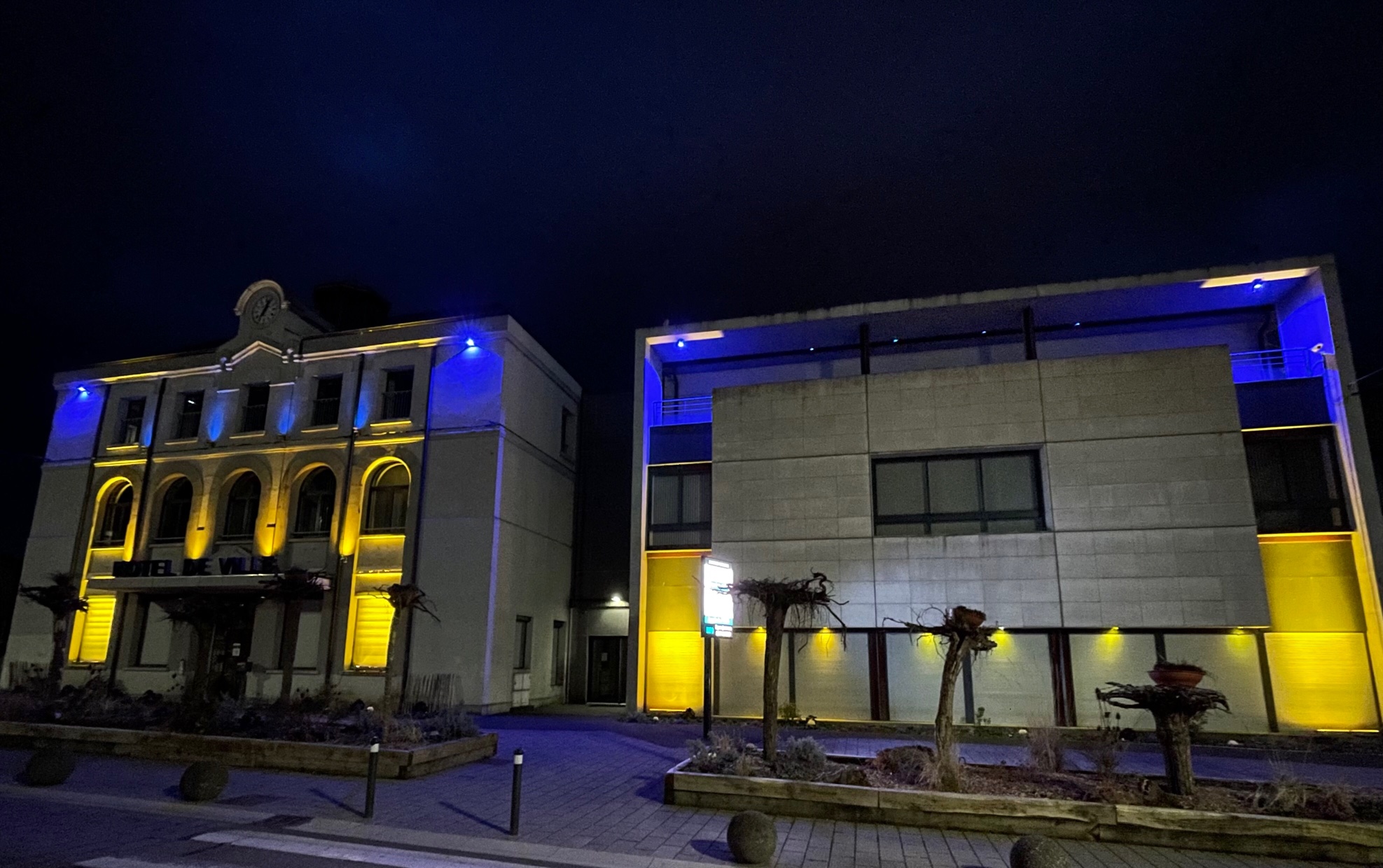 ——
——
The European Summit of Regions and Cities is a gathering of local representatives organised every half mandate by the European Committee of the Regions to discuss the EU’s future challenges.
🗓️Sommet européen des régions et des villes 3-4 mars ⤵️
Inscrivez-vous et assistez aux débats avec élus locaux à Marseille ou en ligne 💻 sur:
Résilience en matière de santé ❤️
Plans de relance pour villes et régions📈
Risques climatiques 🌍 #sommetvillesetregions— European Committee of the Regions (@EU_CoR) February 16, 2022
